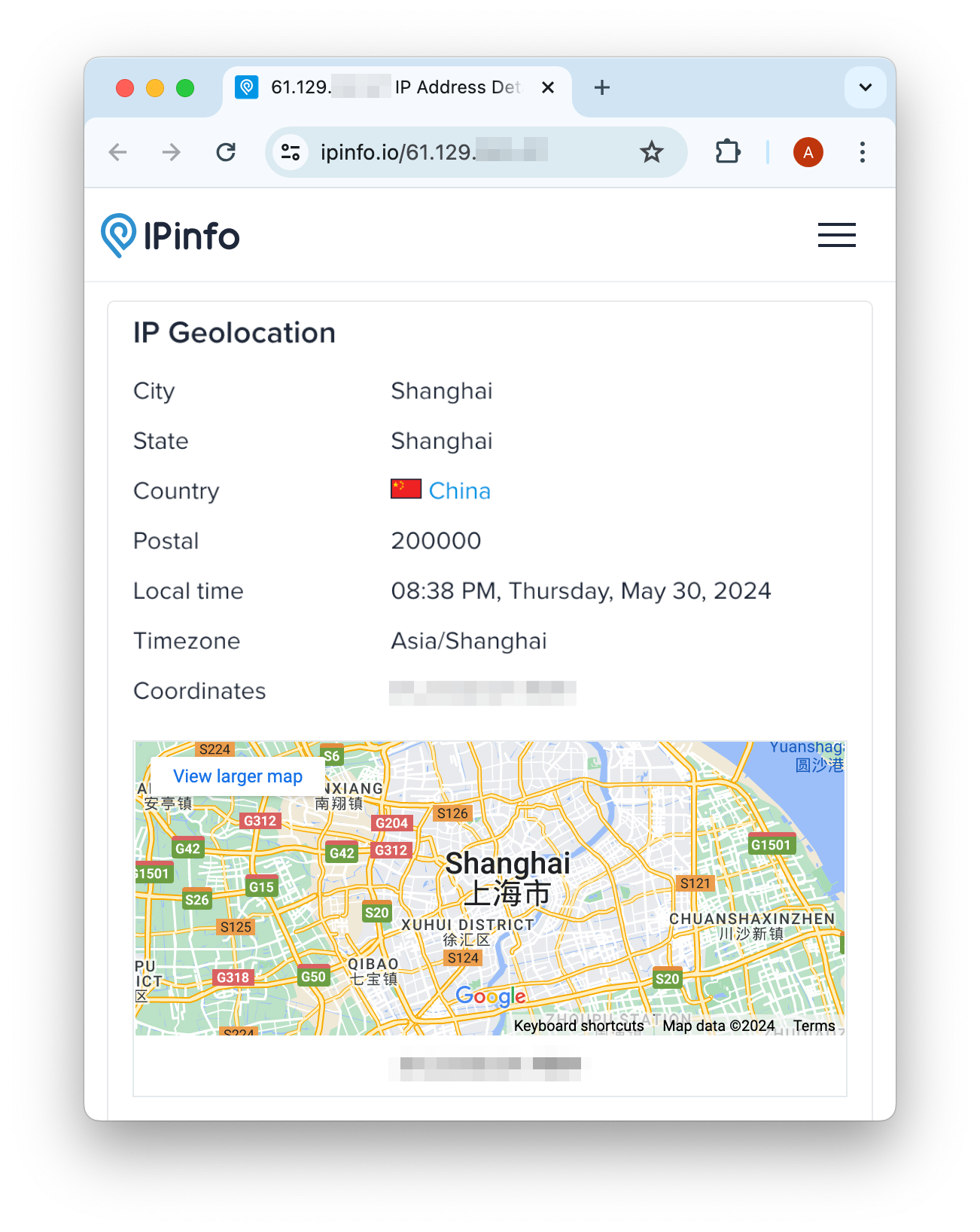VPNs with a data cap receive a reduction to their overall rating.
Here’s a breakdown of exactly what we test for when recommending China VPNs:
1. Success Rate in China: 70%
Minimum Requirement: 50% censorship success rate in China.
We Recommend: Over 70% success rate in China.
To test VPNs in China, we use a virtual Windows 10 PC located in Shanghai. Our team manually tests 15 popular VPN services every two weeks to see if they can bypass the Great Firewall.

Our Chinese IP address and geolocation.
We track success rates of VPNs over the past three months and 12 months by trying to connect to servers outside mainland China and accessing YouTube, Instagram, or Google.
Additionally, we follow any specific instructions provided by the VPN service during testing, or get in contact with customer support if the VPN struggles to connect.
Ratings are based on the VPN’s success rate over the last 12 months. For example, an 82% success rate results in a rating of 8.2/10.
2. Obfuscation Technology: 5%
Minimum Requirement: Active obfuscation technology.
We Recommend: Multiple obfuscation options like proprietary protocols, OpenVPN XOR and Stunnel functionality.
While test results are pivotal in determining a VPN’s efficacy in China, the inclusion of obfuscation features indicates whether a VPN invests in circumventing censorship.
Obfuscation technology serves to mask your VPN traffic, making it indistinguishable from regular internet traffic to get past firewalls and VPN bans. It comes in many forms, such as stealth protocols, obfuscated servers, and proxy solutions.
OpenVPN Stunnel, XOR Scramble and Shadowsocks proxies are among the most effective obfuscation techniques. Certain VPN services, such as Astrill and Windscribe, offer their own proprietary obfuscation protocols.
In regions with online censorship like China, Russia, and Turkey, where VPN usage is heavily monitored, obfuscation technology becomes indispensable.
3. Privacy & Logging Policy: 5%
Minimum Requirement: Transparent privacy policy with only anonymized logs.
We Recommend: Strict zero-logs policy.
Choosing a VPN that respects user privacy and doesn’t log sensitive information is extremely important, particularly for users residing or traveling in China. Given the Chinese government’s prohibition of unauthorized VPNs, maintaining anonymity is crucial to avoid fines.
You shouldn’t use a VPN that records your timestamps, IP address, or any other information that could identify you and your internet activity.
Crucially, you should avoid VPNs that’s based in China, or affiliated with Chinese businesses or the government. Our research uncovered that many of the most popular free mobile VPN apps in the US are Chinese-owned, and an additional four had links to China.
When searching for the best VPN for China, we analyzed the privacy policies and ownership structures of VPNs with the best performance in China. We disqualified any VPNs with links to mainland Chinese businesses and government.
4. Speed: 10%
Minimum Requirement: Consistent download speeds over 60Mbps on connections to nearby countries.
We Recommend: Speeds of 70Mbps or faster for long-distance connections.
The GFW regularly uses bandwidth throttling to censor web content originating from outside the country. Users often encounter error messages that say your server took too long to respond when faced with such restrictions.
Our speed testing methodology involved assessing local speeds from the US, and international download speeds while connected to Australia, Singapore, and the UK.
By comparing these speeds with and without VPN usage, we calculate the percentage drop in performance.
Top-tier VPNs exhibit minimal speed loss when connected to servers within the same continent. Connecting to servers far away can result in slower internet speeds.
5. Nearby Servers to China: 10%
Minimum Requirement: Servers in Asia or the US West Coast.
We Recommend: Multiple obfuscated servers in both Asia and the US West Coast.
For VPNs aiming to circumvent the GFW effectively, the availability of servers in nearby countries is crucial for maintaining fast speeds.
Servers in nearby Asian countries, particularly in Hong Kong, are typically the best choice for achieving high-speed connections.
Additionally, our testing includes servers in Taiwan, Japan, Singapore, and South Korea.
Servers on the US West Coast also deliver good speeds from China and are ideal for accessing US streaming services, such as Netflix and Disney+.
Data Cap Penalty: Up to 50% Reduction
Almost all free VPNs come with a data cap. Like with most limitations on free VPNs, this is imposed to encourage users to upgrade to a premium subscription.
If you use up your data cap, the rest of your internet activity will be outside the VPN tunnel. Consequently, your ISP can monitor the webpages you visit, and you won’t be able to access blocked websites in China.
We apply a penalty to the VPN’s final overall rating for China based on its data cap:
- Unlimited bandwidth: No deduction to the overall rating
- 10GB per month: -20% to the overall rating
- 500MB per day: -25% to the overall rating
- 5GB per month: -30% to the overall rating
- 1GB per month: -35% to the overall rating
- 200MB per day: -40% to the overall rating
- 500MB per month: -50% to the overall rating



